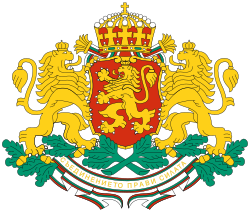Indzhova Government | |
|---|---|
| 84th Cabinet of Bulgaria | |
| Date formed | 17 October 1994 |
| Date dissolved | 25 January 1995 |
| People and organisations | |
| Head of state | President Zhelyu Zhelev |
| Head of government | Reneta Indzhova |
| Status in legislature | Provisional Government |
| History | |
| Predecessor | Berov Government |
| Successor | Videnov Government |
 |
|---|
The eighty-fourth Cabinet of Bulgaria (the Indzhova Government) was a caretaker technocratic government set up by President Zhelyu Zhelev following the resignation of the Berov government. The government, headed by Prime Minister Reneta Indzhova, ruled from 17 October 1994 to 25 January 1995 at which time the new cabinet took office.